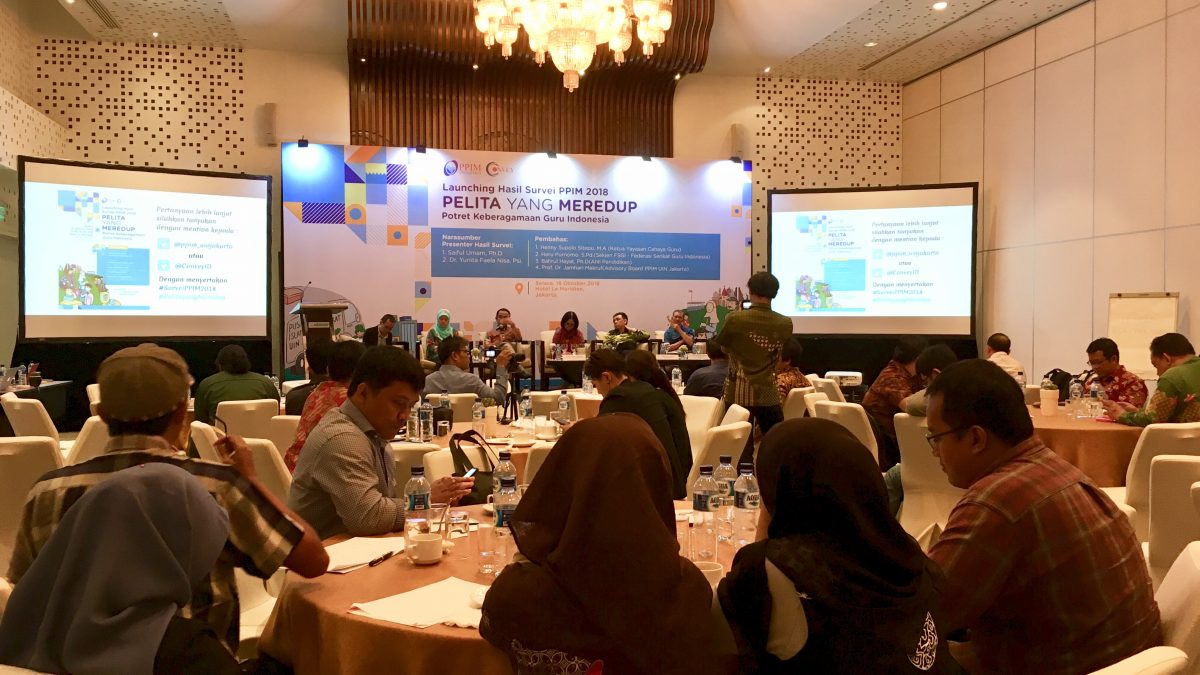Also listen to the news about the Launching of the PPIM National Survey “Pelita yang Meredup: Potret Keberagamaan Guru Indonesia”
The Executive Director of PPIM UIN Jakarta, Saiful Umam said that the results were obtained based on the Implicit Association Test (IAT) measurement tool. Meanwhile, the results obtained with the (explicit) questionnaire were not much different, where 56.09 percent of teachers had intolerant opinions towards followers of other religions.
“But both (measuring instruments) we can see that the percentage is already above 50 percent. Because they explicitly read the questionnaire, the results are different. And if the explicit direction can be guessed, “said Saiful Umam.
This was conveyed by him during the disclosure of the results of the National Survey – Fading Light: Portraits of the Religious Teachers of Indonesia, at the Le Meridien Hotel, Jakarta, Tuesday (16/10).
Saiful gave an example of an intolerant opinion among teachers, it was seen that as many as 56 percent of teachers did not agree that non-Muslims could establish a religion-based school near them, and as many as 21 percent of teachers did not agree that neighbors of different religions could hold religious events.
Measuring the level of radicalism among teachers using a questionnaire measuring tool (explicit) shows, as many as 14.28 percent have very radical and radical opinions. Meanwhile, using the implicit measuring instrument (IAT) shows that 46.09 percent have very radical and radical opinions.
In terms of radical opinion and radical action intentions, it shows that 33 percent of teachers agree to encourage others to fight to create an Islamic state. And 29 percent of teachers agreed to join the jihad in the Southern Philippines, Syria, or Iraq in fighting for the establishment of an Islamic state.
According to Saiful, there are three factors that can be linked to teacher intolerance and radicalism. The first is the view of Islamism. Second, the demographic aspect, and the third is the role of mass organizations and sources of Islamic knowledge.
“The Islamism factor is one of the important variables related to teacher intolerance and radicalism. The view of Islamism contributes to intolerant opinion and action intentions. In opinion and intention of action, it is related. Likewise, the view of Islamism has contributed to radical opinion and action intentions. So both are positive views of Islamism in the form of opinions and action intentions, “he added.
With the results of this survey, there were several recommendations submitted by his party. One of them, said Saiful, is to improve teacher welfare because the survey results show that teacher income correlates with tendencies of intolerance and radicalism.
On the same occasion, Secretary-General of the Indonesian Teachers Federation (FSGI) Heru Purnomo felt shocked and saddened by the results of this research. Although Heru saw that the object under study was incomplete, he still appreciated the results of this research.
Heru said that the vision and mission of the FSGI itself is to create equitable education, as well as support diversity. Therefore, according to him, the results of research that showed a high level of intolerance and radicalism among Muslim teachers were a threat to Indonesia.
“So this research can be used as a tool to convey, to inspire again, not to let the potential for radicalism and intolerance cause teachers and students to be trapped in a state of passive radicalism. The condition of passive radicalism between students and teachers, overtime when the teacher thinks that he wants to change this country into Islamic law, to become Islamic, and so on when this is very widespread, this will eventually uproot the Pancasila personality in society, “said Heru.
In the future, Heru hopes that the results of this research can be socialized so that teachers will no longer have a sense of intolerance and radicalism.
This survey was conducted on 2,237 Muslim teachers from Kindergarten / RA, SD / MI, SMP / MTs, and SMA / SMK / MA in 34 Provinces in Indonesia, wherein each province a Regency / City was chosen randomly based on a probability proportional to technique. size (PPS).
The survey was conducted from 6 August to 6 September 2018. This survey has a margin of error (MoE) of 2.7 percent, with a confidence level of 95 percent. [gi/ab]






